“I, I will be queen
And you, you will be king
Though nothing will drive them away
We can beat them, just for one day
We can be heroes, just for one day.”
As a cover of David Bowies’ “Heroes” resonates in the pool of Châlons-en-Champagne in France, all eyes are on Arianna Sacripante and Giorgio Minisini of Italy performing their inclusive mixed duet routine.
They, along with nearly 70 others, are competing in the 2024 World Artistic Swimming Championships for Athletes with Disabilities. Their journey, alongside those of countless other swimmers worldwide, and this event represent years of progress in opening artistic swimming to adaptive athletes.
However, the path hasn’t been easy. For most, barriers persist due to the lack of a formal international federation, consistent support from national governing bodies, and inclusive regulations.
Even so, efforts in countries like France and Italy, but also Brazil and the U.S. amongst many others, have made artistic swimming more accessible to adaptive athletes, creating inspiring opportunities for them to shine.
These 2024 World Championships — hosted by the French organization Nat’Handi Artistique — have held particular significance for the athletes, coaches, and advocates who have long fought for greater inclusivity in the sport.
Building Inclusive Pathways in France through Nat’Handi Artistique
Sandra Millart is the current president and one of the co-founders of the association Nat’Handi Artistique, a driving force for adaptive artistic swimming in France. Her journey began when her daughter Elsa encountered challenges in artistic swimming due to her severe bilateral deafness.
Elsa, who took up the sport in 2015, trains with a bone conduction headset that enables her to feel the vibrations of music. However, this device, which is necessary for her training, is not allowed in competition. So, she has to learn the music by heart, use visual cues and ultimately do her best to swim like any other athlete.
Inspired by her daughter’s drive and resilience, Millart looked for a path for other adaptive artistic swimmers. She could see that there were competitions and gatherings across the Atlantic, but didn’t know how to get the same thing going in France.
Through the first virtual World Championships for Athletes with Disabilities following the repeated COVID-19 lockdowns, she connected with coaches Vanessa Simian and Noémie Gaillard, and together, they launched Nat’Handi Artistique in 2021.
The organization acts as a bridge between athletes, clubs, and coaches across the country, and currently counts about 15 registered adaptive swimmers. Nat’Handi Artistique works on building networks of support, organizing training camps, and encouraging dialogue so that everyone can find a sense of community.
“Our main goal is to ensure that young girls and boys don’t quit artistic swimming because of their disability but only for other reasons, like their studies or loss of interest,” Millart said. “And not because they feel alone or unsupported. Disability should not be the reason why they give up artistic swimming. So, our aim really is to strengthen solidarity between swimmers, so that they can support each other when they face difficulties, but also so that coaches can connect, exchange, and feel encouraged too.”
Nat’Handi Artistique also provides opportunities to meet with elite artistic swimmers, such as French Olympians Eve Planeix and Laelys Alavez, who support the association, or the Canadian Olympic team, with whom the adaptive athletes got to discuss and train alongside prior to the Paris Games.
Three years after being established, the association boasts a few victories, such as the creation of the first adaptive podiums at regional competitions, and the registration of new clubs, which are gradually opening adapted sections and welcoming new athletes.
Last August, shortly before the Paralympic Games, Millart and Nat’Handi Artistique took upon the task of hosting the 2024 World Championships. A colossal organization made possible by the association’s own funds, an online fundraising campaign, and by a few arrangements which ensured that the budget stayed within its allocation.
In the end, the event was a huge success, bringing together an unprecedented number of athletes, with 42 adaptive swimmers and 27 able-bodied athletes representing seven countries. All sharing a passion for artistic swimming that transcends physical or cognitive limitations.
In a supportive and benevolent environment, they competed in inclusive duets and mixed duets, team routines, as well as solo and figures, marking a high point for adaptive artistic swimming. For Millart, the event’s true success lay in the community it created.
“The atmosphere was magnificent,” she recalled. “Competitors and teammates supported each other with goodwill and friendship. At the end of the day, we were all there for the love of artistic swimming. It was very touching to see such a display of support and appreciation for all the athletes who were there.”
Beyond these championships, Millart hopes to see the discipline officially recognized and supported, with proper regulations and financial resources to facilitate inclusion in regional and national competitions.
Artistic swimming is already considered a niche sport, which makes it all the more difficult for the relevant sports federations – in this case three – to formally acknowledge para-artistic swimming. So, it is all still managed by volunteer clubs, who sometimes face endless administrative procedures and no public subsidy.
However after Châlons, she is optimistic for the future:
“Around 20 French judges attended the championships, and everyone felt it was time to turn the corner at every level. We have to keep this energy going to implement inclusive rules so that each athlete has a clear path ahead and feels supported in their passion.”
Progetto Filippide’s Dedication to Empowering Athletes
The fight for inclusion and recognition has been fairly similar for all nations in attendance in Châlons. In Italy, Progetto Filippide has been at the forefront of inclusive sports for autistic individuals since 1983, not only in artistic swimming but also athletics and swimming.
Sabrina Bernabei has led the artistic swimming team for over a decade – an experience she says has been transformative for her – and now coaches around 20 athletes. They train four times a week, in sessions that mirror the rigor of able-bodied programs while naturally being adjusted for each athlete’s unique needs.
The 2024 World Championships tested her athletes in new ways, as they competed in multiple events for the first time. Besides the figures and solos, they also performed in inclusive duets and mixed duets.
“It was a very important competition for us,” she explained. “To do all these events in one championship was very hard for them, but they did it! The athletes were very, very happy. Every new step for them is so interesting. It helps them develop a new and better way to live their life and gives them so much self-confidence. They know they have fewer opportunities, so they put everything they have into everything they do. Witnessing their passion and growth is a very emotional experience.”
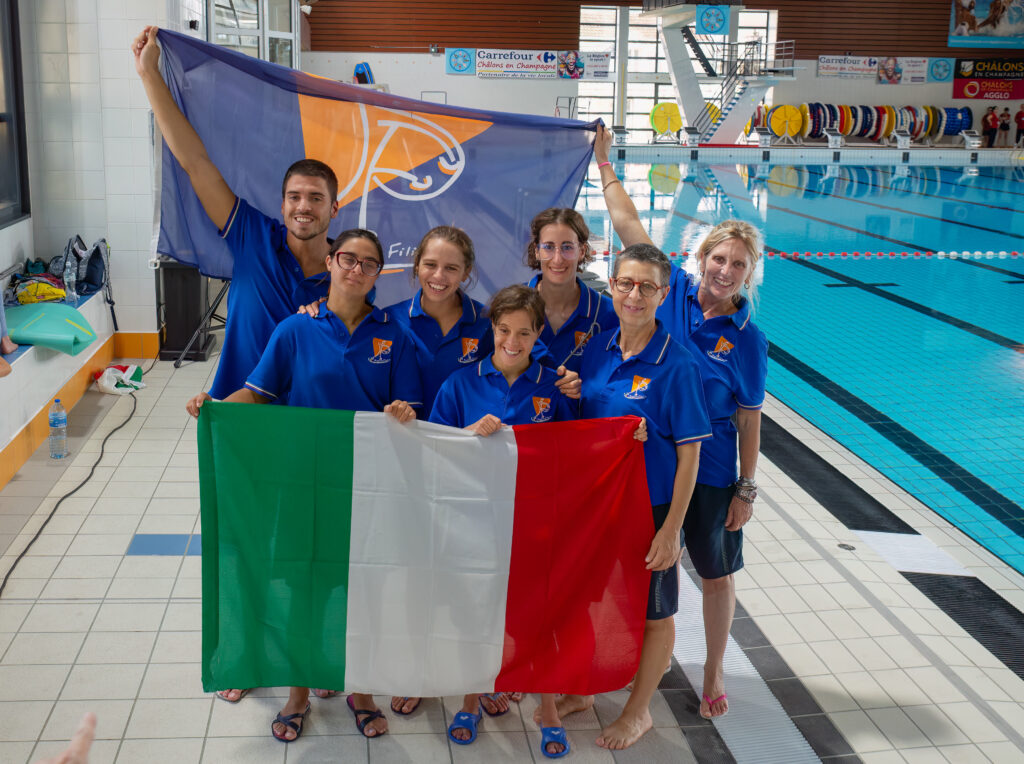
Together since 2017, Arianna Sacripante and Giorgio Minisini have, in a way, become the faces of adaptive artistic swimming. Over the years, the pair has been able to showcase its mixed duet in numerous elite competitions, like at the gala of the European Championships in 2022, and the World Series Super Final in 2019.
As a multiple-time World and European Champion, Minisini has used his platform to bring awareness to adaptive artistic swimming, advocating for integration between disabled and able-bodied athletes.
Now retired from elite competition, he intends to coach within Progetto Filippide and continue fostering an environment where all athletes, regardless of ability, can excel.
“My vision has always been the same from when I started,” he said. “We are two athletes with the same passion, showing that the sport can be one for all. The goal is to remove barriers and create a future where artistic swimming is integrated and inclusive.”
Inspara’s Grassroots Efforts to Foster Inclusion in Brazil
Across the Atlantic in Brazil, Camila Lazzarini has championed adaptive artistic swimming since founding Inspara (Instituto Inspiração Paradesportiva) in 2016. Inspara, a non-profit organization, currently supports 28 athletes with various disabilities, offering them a safe, inclusive environment to train and compete.
Much like Millart and Bernabei, Lazzarini faces a shortage of resources and official support. There are no inclusive championships outside of the “Torneio Inspara de Nado Artístico Inclusivo”, an annual event Inspara organizes to include all artistic swimmers—beginners, veterans, and athletes with disabilities alike.
However, this trip to France and these World Championships deeply inspired her and her athletes to continue forging ahead:
“At this competition, I was able to see what all this means for each of the athletes and their families. It motivated me even more when I returned to Brazil, to continue with the hard work with all our athletes. This goes far beyond the medals and the results. These experiences have an immeasurable, positive impact on the life of each one who is there.”
Lazzarini hopes that the momentum sparked in France will continue and encourage countries to keep this flame alive, working together to develop standardized rules and classification systems. By building on these international events, she aims to drive national progress as well, ultimately increasing opportunities for athletes with disabilities and fostering inclusive events for all in Brazil.
Artistic Swim AWD’s Advocacy for Greater Access and Opportunity
In the United States, Tina Boales has spent years advocating for adaptive athletes through her work with Bay Area Synchro and Artistic Swim AWD, an organization she helped establish.
This summer’s experience at the World Championships also only deepened her commitment to advancing the sport for athletes with disabilities.
“It gave my spine chills as to how well organized it was, how receptive the French officials were, and how this opportunity presented was well-received globally,” she said.
Boales’ journey began when her daughter Raquel, who has Erb’s Palsy, took up artistic swimming at the age of nine. Her participation in the sport was initially met with skepticism from local teams, but through persistence, she advanced through the age group levels and became a successful competitor, winning national and international medals.
In 2015, she along with other coaches and parents, including from Canada, founded the non-profit organization Synchronized Swimming for Athletes with Disabilities (AWD) – now Artistic Swim AWD –, setting the stage for the development of adaptive artistic swimming in the U.S. and worldwide.
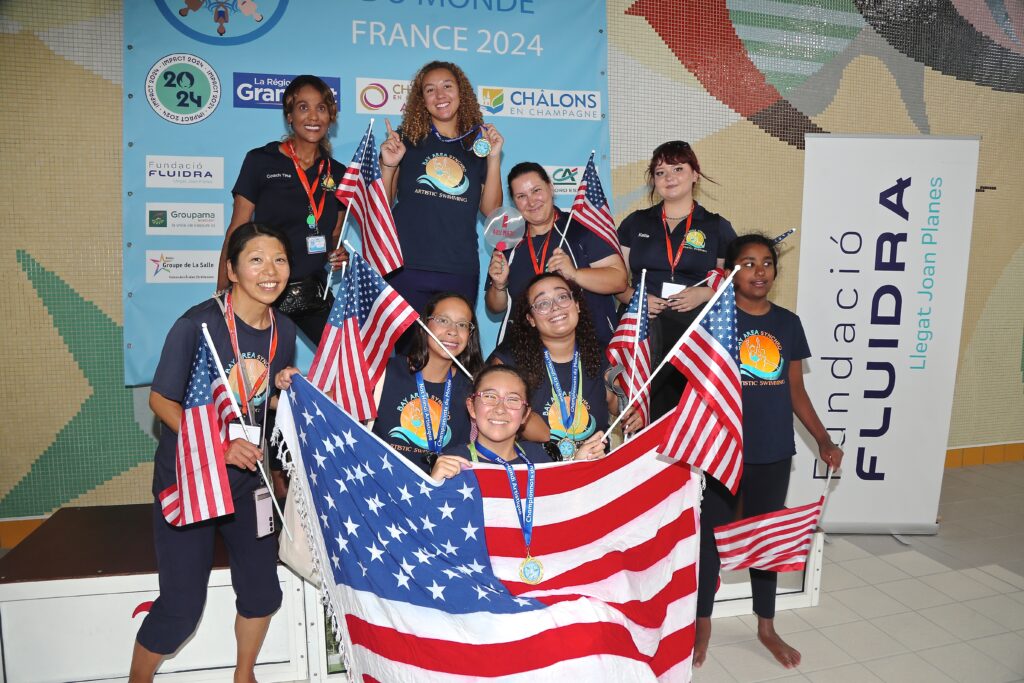
“Artistic swimming at any level increases self-esteem, encourages independence, and enhances the quality of life for many athletes with disabilities and special needs,” Boales said. “To promote the sport of artistic swimming amongst our youth and adults with disabilities and special needs is our mission.”
In 2020, USA Artistic Swimming developed specific AWD rules and formally included them in its rulebook. The following year, the federation established proper AWD tier categories for the first time at the Junior Olympic Championships and eventually most other competitions, making the U.S. one of the few countries to hold inclusive national events.
In the long run, Boales, like all, dreams of seeing artistic swimming at the Paralympic Games. To get there, the organization continues to envision future collaborations with federations worldwide, working together to develop international standards and open up more opportunities in as many countries as possible.
Toward a Shared Vision – France’s Legacy and the Future of Adaptive Artistic Swimming
Adaptive artistic swimming is poised for continued growth, driven by passionate advocates and organizations that champion inclusion, create opportunities and grow community networks, all while demonstrating the sport’s transformative potential.
Events like this year’s World Championships have sparked a powerful momentum, inspiring calls for formal support, standardized rules, more inclusive competitions, and dreams of an eventual Paralympic inclusion as collaboration across borders and visibility continue to grow.
In the meantime, the legacy of Châlons-en-Champagne lives on as a beacon for all adaptive athletes, showing them that through determination and solidarity, they too can be heroes—even just for one day.
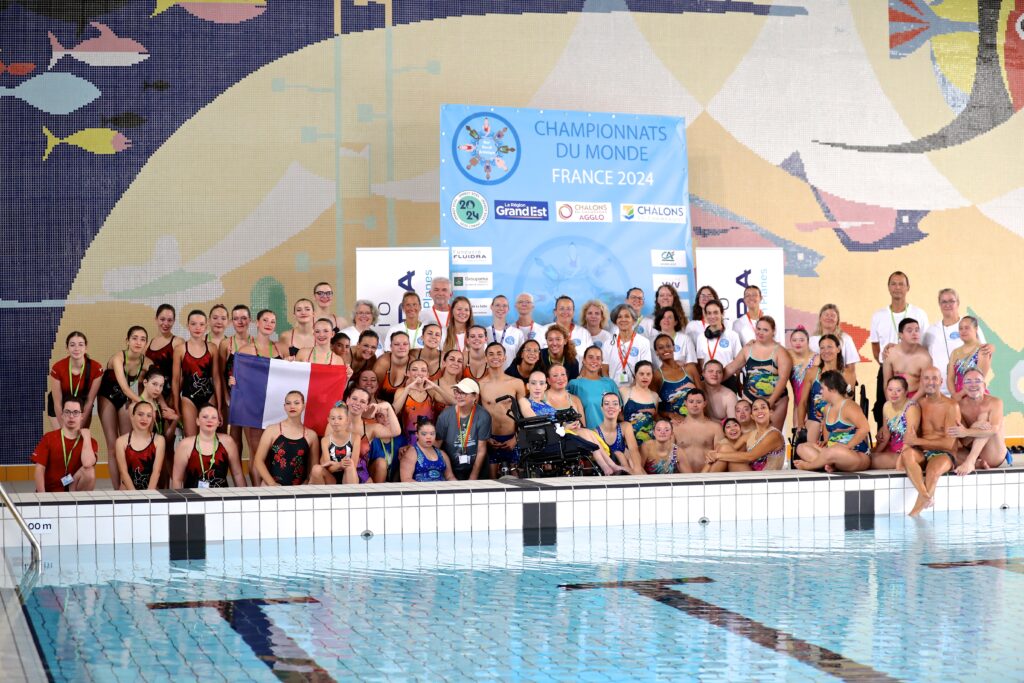
ARTICLE BY CHRISTINA MARMET
If you’ve enjoyed our coverage, please consider donating to Inside Synchro! Any amount helps us run the site and travel costs to cover meets during the season.

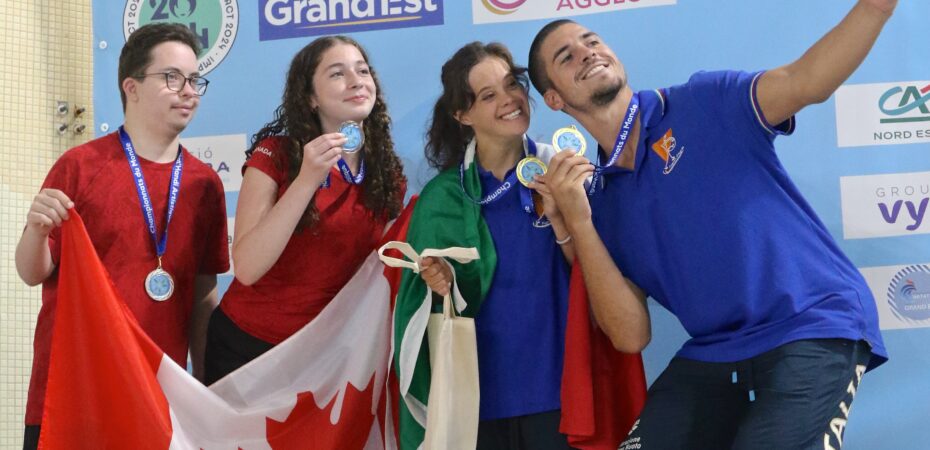
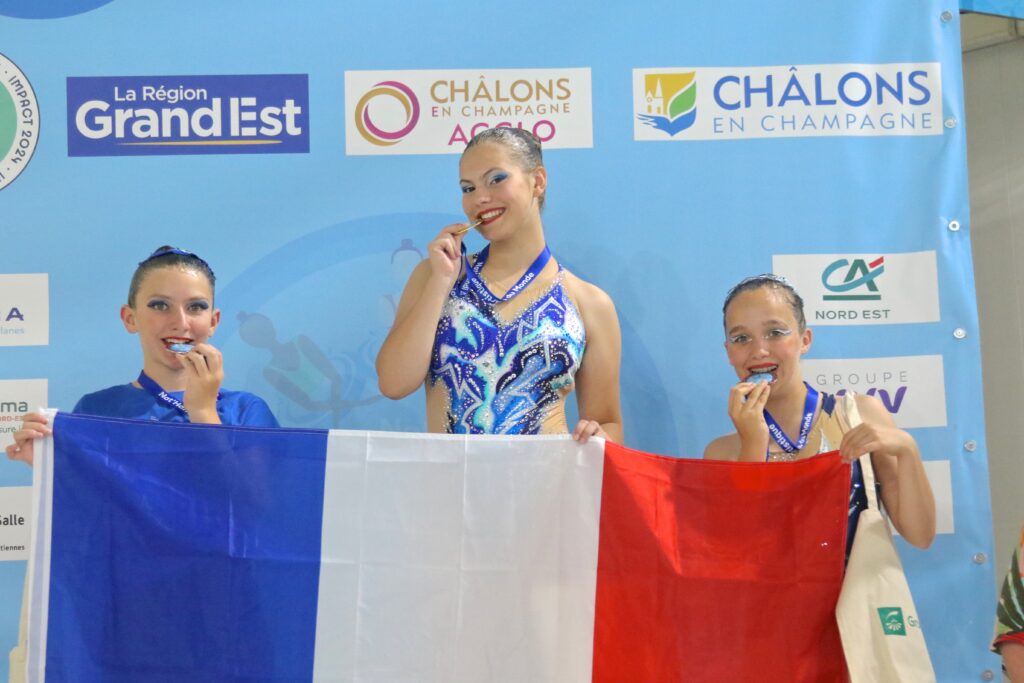
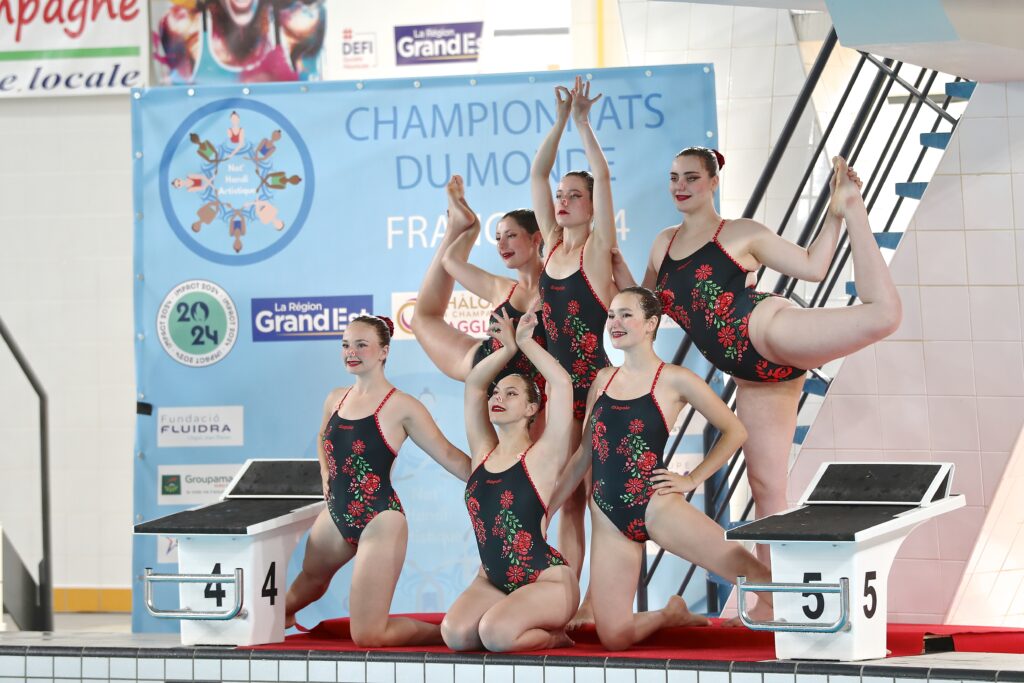
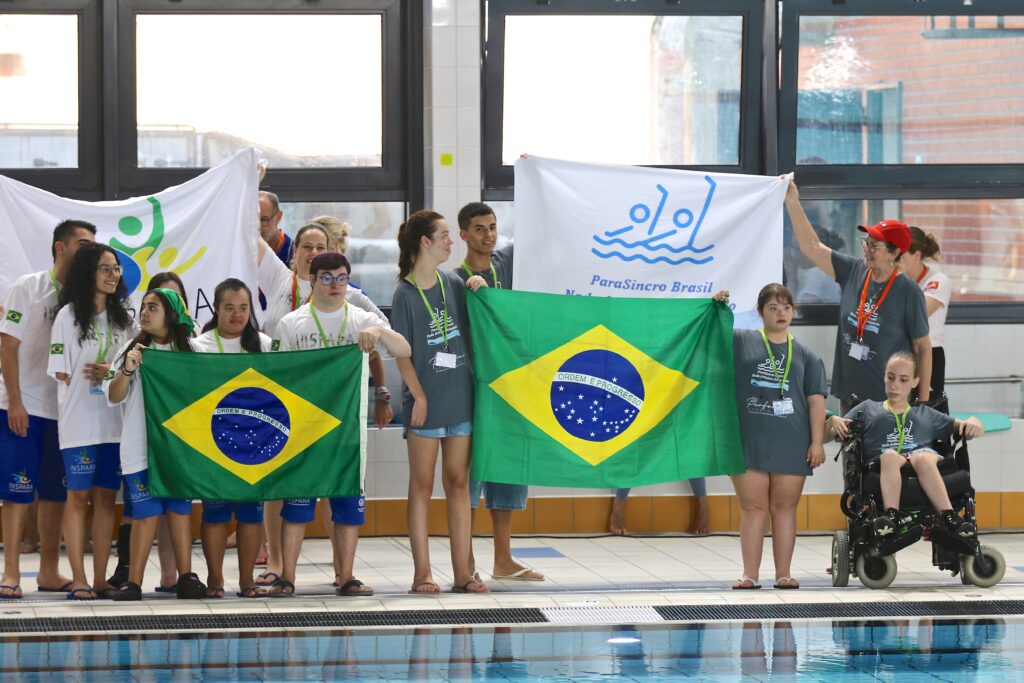
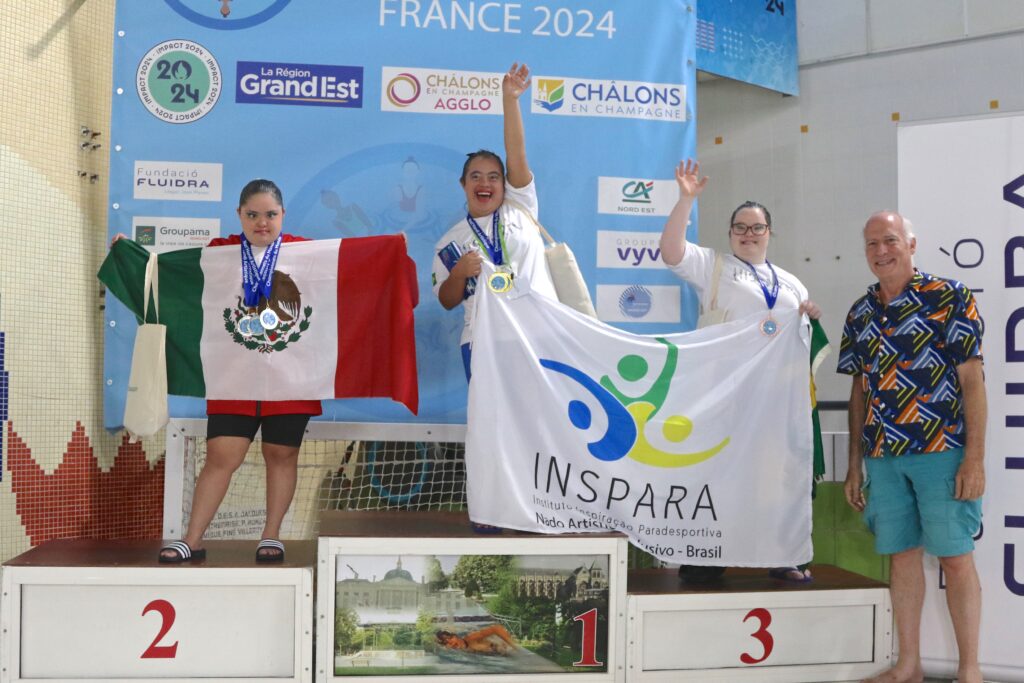
Thank You!!!